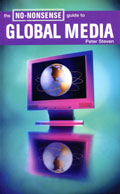
| Home News Releases | Calendar Contact |
Sources Bookshelf

The No-Nonsense Guide to Global Media
Steven, Peter
Publisher: New Internationalist Publications/Between the Lines, Toronto, CanadaYear Published: 2004
Pages: 144pp Price: $14.95 ISBN: 1896357873
Library of Congress Number: P90.S75 2004 Dewey: 302.23
Please see our media profile in Sources:
Sources Select Resources
The No-Nonsense Guides are a series of books dealing with common topics of concern which most people care about but, find difficult to accurately research either due to a shortage of information or an excess of it. These include issues such as climate change, democracy, world history, sexual diversity and terrorism. The No-Nonsense Guide to Global Media tries to deal with multiple aspects of modern media including their effects on society, their history, the technology involved in producing and transmitting data, the influence of political and economic forces on media, the dangers of not understanding media's power and limitations and ways to work towards "a better media world."
Peter Steven aims to make readers realize the power and influence of dominant media but, at the same time, also understand that they are not "omnipotent" and that there are alternative forms available. He talks about how different cultures interpret media programs differently and how, though many forms of media are globalized and shared by multiple cultures around the world, many forms are localized and very diverse. The author also discusses how both direct and indirect political and economic factors influence media which in turn affect culture over time. He describes media as a reflection of society, as well being an influence on it, and gives an overview of why and how "we watch, listen, read and surf." The book contains a chapter on the technological aspect of media and discusses how non-technological conditions affect the advancement of technology and vice versa. It briefly explains some technical media-related terms like "broadband," "satellite," and "compression technology."
The book is short, interesting, informative and relevant to multiple fields of study. It contains maps, tables and charts to supplement the textual information provided and, also has multiple focus boxes within the text which provide interesting snippets of information from around the globe.
[Abstract by Nabeeha Chaudhary]
________________________________________________________-
Steven is the well-known author of "Brink of Reality" and "Jump Cut". This current book is one of a series on issues, such as Fair Trade, the Arms Trade, HIV/AIDS, which have come out the New Internationalist magazine topical issues. The media here is, of course, more than just news: there's film, TV, radio, recording, publishing, and the Internet. There has been more globalization lately because of multi-national ownership, satellite TV and the Internet. Steven sits firmly in the camp that says the media shape the way we lead our lives. Thus, the book becomes a polemic, with lots of examples and anecdotes from the Toronto area (Steven is based here). He has quotes, sidebars (in smaller typeface), tables and charts. Much of our media in the First and Second World impacts on the Third World, and that is a continuing concern. He cites media criticism found in magazines (Adbusters, Jump Cut), BBC radio shows, and papers such as The Guardian and Le Monde, as well as Web operations. His footnoted sources show plenty of online sources where everyone is a media critic. But his bibliography shows only four books.
Audience or interest level: the converted, giving them ammunition for talking to others.
Some interesting facts: "We cannot underestimate the power and brute force behind the barons of global media, the Rupert Murdochs and Silvio Berlusconis of the world who wield political and economic power as well as the ability to shape dreams through our entertainment".
What I don't like about this resource: a footnote reads "Michael Moore, if you are out there send us your email address". Huh? Is he that hard to find, with his own Web site at www.michaelmoore.com???
What I do like about this resource: cogent and concise, even scary.
Quality-to-Price Ratio: 97.
[Review by Dean Tudor]
Subject Headings
- Audience Research
- Australia
- Book Publishing
- Brazil
- Canada
- Censorship
- China
- Cinema
- Entertainment Industry
- Film Industry
- Hegemony
- India
- Indigenous Media
- Internet
- Invasion of Privacy
- Iran
- Iraq
- Korea
- Mass Media
- Media
- Media/Influence of
- Media Ownership
- Media Ownership/Concentration of
- Mexico
- Music Industry
- News
- News Bias
- News Coverage
- Nigeria
- Privacy
- Publishing
- Radio
- Satellite Broadcasting
- Satellite Networks
- Senegal
- Technology
- Technology Commercialization
- Technology in Entertainment
- Television
- United Kingdom
- U.S. Culture
- Women's Issues/Media
© Sources 2023. The information provided is copyright and may not be reproduced in any form or by any means (whether electronic, mechanical or photographic), or stored in an electronic retrieval system, without written permission of the publisher.